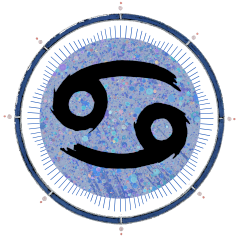
Dear Friend and Reader:
Monday, I was grousing around the issue of Pluto’s demotion in 2006, at which time Neptune was declared the “furthest planet from the Sun.” Apropos of Neptune, this is plainly false: there are known to be 750,000 planets orbiting our Sun, and many thousands of them, relevant to astrology, astronomy and culture, are well beyond the orbit of Neptune.
Neptune is definitely the furthest planet from the Sun, if you ignore all the others beyond it. Making this claim into “scientific truth” was merely a matter of arbitrarily defining a particular type of orbiting body as a planet that was at once politically and financially driven (astronomers, as happens in nearly all professions, engage in power plays, and some sell books).
Yet we were left with a curious state of affairs, where the symbolic (and official) definition of “the edge of reality” (the most distant planet) is concerned. Neptune is not an edge at all; it is a fog. There is no boundary.
A planet associated with delusion, deception, distorted consciousness, denial, drink, drugs, denial, dreams and a few other D words was accepted as the bottom line, by a bunch of scientists. This decision presaged the conduct of scientists and the state of culture for decades to come.

Neptune is Easily Corrupted
Neptune on a good day can represent inspiration and a kind of spirituality, though this is easily corrupted (by anything from alcohol to drugs to phony preachers to advertising, all of which fall under Neptune’s astrological domain). When Neptune is a factor, what is taught is not necessarily what is true, and within Neptune-based philosophies, few people seem to care. (Read full article here.)
An authentic spiritual path, like any other endeavor where much is at stake, must concern itself with what is real — and that means conducting an investigation rather than merely believing what seems wholesome enough. One ‘belief system’ is not like another. Yet today, most people think everything is a matter of opinion. We live in times when it is suitable for people we call scientists to state the outcome of their study before they conduct the research and experiments.
Neptune is best used for the creation of music, impressionist painting, other forms of art based in beauty, appreciating nature, gazing at the ocean, and fantasy for its own sake. That is not what we usually get in the world.
According to astronomy, which is supposedly an empirical science based in mathematics and physics, all those D words are the edge of reality. In a way this is fitting. Within the awareness frame of Neptune, if you think something is true, then it must be. This saves a lot of effort, and is how society is functioning today.
The previously acknowledged furthest planet was Pluto, which in our era is understood to be about driving the growth of the soul. Pluto may be rough going at times, but at least it focuses us on actual necessity, and the bottom line when it comes to our purpose for incarnation. As Martha Lang Wescott said, Pluto transits are difficult, but we miss them when they’re gone.
A discovery in 1992, more distant than Pluto and now called Albion (formerly 1992 QB1) offers an alternate take on the bottom line of growth, one that is more voluntary than Pluto. If Pluto drives the soul by acknowledging death, Albion drives the soul’s journey by engaging sexual truth and chosen transformation.
Eclipse and Mercury Square Neptune
What is your personal commitment to truth? What are you willing to put yourself through to go in that direction? How hard are you willing to work to get to the bottom of anything? What risk are you willing to take to stand up for what you know is right?
This week we experience the first solar eclipse of 2021, and it happens in somewhat grand style. The eclipse is conjunct retrograde Mercury to within one degree — very close — and the eclipse and Mercury are all square Neptune.
This eclipse is about our relationship to truth and lies. Mercury retrograde in Gemini would be enough to evoke that theme; square Neptune is triple word score. Add an eclipse to it and we are talking about a balance upon which hangs our path to the future.
The truth is a controversial topic. Today we pretend it does not exist, or rather, that one’s personal truth takes precedence over what is proven by repeated experimentation, or what is subject to such proof. This is a toxic comfort zone.
Only people who lack commitment to their own personal truth could say that there is no such thing as an established empirical fact. This is very much the issue. And it goes further: people who tell ‘small’ lies generally cannot conceive of people telling whoppers. Also, the people who tell ‘small’ lies often do so to avoid confrontation. You cannot expect them to show up when it’s time to challenge a big lie.
The Pointed Message of Radical Honesty
A therapist by the name of Brad Blanton wrote book a while ago called Radical Honesty. As you might expect, the book’s message is pointed, and it makes most people uncomfortable.
“We all lie like hell,” Blanton writes. “It wears us out. It is the major source of all human stress. Lying kills people.”
He adds, “The kind of lying that is most deadly is withholding, or keeping back information from someone we think would be affected by it.”
Another form of lying is making excuses, such as “it will hurt his feelings.” Personally, I would rather be told, “I have a new boyfriend and don’t want to hang out with you” rather than hearing, “I am taking an online class,” “I am so busy with work,” “I’m not getting out much,” and so on — which may be true but which leave out the salient fact of the new boyfriend. And that is suffocating. x
Yet this is a real crowd pleaser. It is toxic and it is the way that most people live, thinking it makes them a better person. Excuses both well-crafted and shabby usually get the job done. This saves everyone the trouble of confronting reality, of discussing uncomfortable topics, and being called out on their own lies and excuses.

We Need to Get Angry About Being Lied To
There was a time when people got angry about being lied to. However, I’m having a hard time remembering the last time that was. Let’s see. In 2003, the president and his whole administration were on every news program every night saying that Iraq 1) was responsible for the Sept. 11 attack and 2) was in possession of weapons of mass destruction that it was ready to use on the United States, and therefore, we should invade and bomb them.
That turned out to be a lie, and a lot of people figured it out in advance. There were protests in every major city on Feb. 15 of that year. Millions of people poured into the streets, demanding that the truth be honored.
Back in 1987, we learned that members of the administration had sold weapons to an enemy country (Iran) for use in a war against our ally (Iraq), and had then funneled the profits to a military operation (the Contras) in violation of federal law. People were angry about that and the president personally had to show his contempt (“There is bitter bile in my throat”) even though he knew all along that it was happening. Several members of his administration resigned immediately and others were convicted in criminal trials. Some served jail time.
Back in 1974, the president was forced to resign for lying. By that time he had lied about everything: the Vietnam War, the Watergate break-in and the whole web of intrigue that had turned the U.S. government into his own personal mafia. Many senators in his own political party were concerned that their constituents were angry about all that lying. They told the president they would vote to convict him at the impeachment trial, and he quit.

Break the Eerie Silence
I am having a hard time coming up with other examples. If you can think of any that resulted in real change, please remind me. Right now, we live in a blizzard of suffocating deception, which creates an eerie and deadly silence where the most important matters of our lives are concerned. It’s time to get pissed off, without remorse or regret. I don’t mean simmering perpetually in rage. I mean feeling your anger and expressing it, and then doing something about it.
In the public sphere, we are smothered with deception, without remembering the thing about how if someone says something enough times, it becomes true, at least within public consciousness. This deserves some rage directed at it. That rage would make people comfortable, and that’s exactly what we need.
We also need to show more actual emotion about being lied to in small ways. However, most people feel too guilty about their own transgressions about truth to call out anyone else. So the first step is experiencing the power of telling the truth, and holding that as your personal standard. This involves doing something that many would find challenging: not believing lies. Every deception has at least two parties: the perpetrator, and the supposed victim who generally refuses to verify the facts.
We often hear people question when everyone else is going to wake up. I don’t now when this will happen, though it will be a good sign when people refused to be deceived. That, however, might make you uncomfortable, whether you’re the one refusing, or if you’re confronted by those who are. If so, count yourself as one blessed.
As Mark Twain said, it’s easier to fool people than to convince them they have been fooled. And if you may be swayed by the facts and you can admit you were wrong, then consider yourself twice blessed.
With love,




